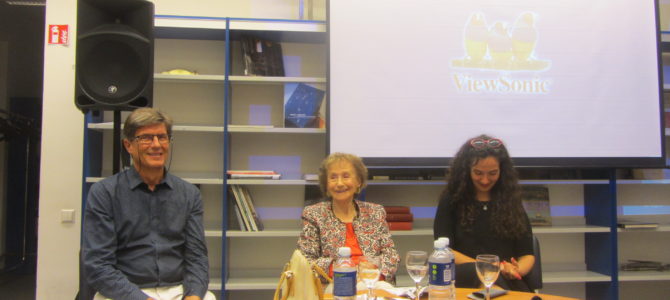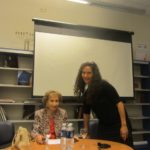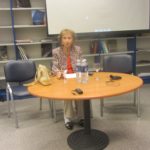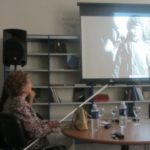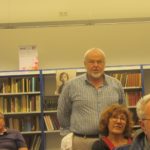On Wednesday Kaunas Holocaust survivor Dita Zupavičienė-Šperlingienė spoke at the Vilnius Jewish Public Library and presented a home movie.
The silent film was a series of street scenes from Vilnius, Riga and Lvov before the war. Zupavičienė-Šperlingienė explained how her uncle Hanon, a medical student in Paris, used to come visit the family. In bed for over a week with scarlet fever, the young Dita was overjoyed when her physician uncle told the family she could get up and do things around the house without making it worse. Dita said she jumped out of bed at the first opportunity and from that time on Hanon became her favorite uncle.
Hanon was an amateur filmmaker and used an 8 mm camera on some of his travels. As the Nazis drew closer to Paris, he grabbed a bicycle and rode south, to Vichy France. Zupavičienė-Šperlingienė said he soon discovered life was dangerous for a Jew there, as well. After the Holocaust Hanon continued to live in Paris. Dita made it to Israel where it turned out she was, for whatever reason, one of the few Jews able to teach the German language. In the early 1970s she had the opportunity to improve her German teaching skills in West Germany, and visited Hanon in Paris during that trip. That’s when he mentioned he still had some of the footage he had taken before the Holocaust.
Zupavičienė-Šperlingienė said she was amazed as the old-fashioned AGFA logo faded into the faces of her mother, father, sisters and friends. She said the film or a copy of it has been on exhibit at a museum in Tel Aviv since the early 1970s when she brought it there, but had never been shown in Lithuania before now.
Just about 10 minutes long, the scene begins in early 1930s Kaunas along the river and moves to Freedom Alley, taking in shop signs, street cleaners and strollers. Hanon then shows Dita’s mother and father with their children and friends walking in Kaunas. The action jumps abruptly to Riga with more moving pictures of the street and people. Riga suddenly becomes Lvov, the former Lemberg, “in Poland” Dita narrates, as if in the present tense. Street signs and posters are in indeed in Polish. Random scenes of people literally raking mud in streets fade to children jumping along the gutter on another street, then pictures of Jewish men dressed up, hurrying to the railroad station to meet some famous rabbi, with young women in head coverings carrying cans of milk. The Jews look completely at home, walking in their home town, part of the landscape.
Dita Zupavičienė-Šperlingienė spoke briefly after screening, then library director Žilvinas Beliauskas solicited questions from the audience. Geršonas Taicas asked her about the initial hours and days of the Nazi occupation. Dita spoke of her and her mother’s escape from Kaunas to the town of Vilkija and their return. Beliauskas urged her to continue, but it was obvious it was a burden for her to tell her stories and remember her lost family members. Almost apologetic for the jarring juxtaposition of innocuous home movies and Holocaust horrors, Dita tried several times to tell funny stories to lighten the mood. One audience member asked her about the Stutthof concentration camp where she and her mother and sister were sent, and whether different ethnicities received different treatment there. “Well, of course there different categories of prisoners,” she said, pointing to an imaginary star on her chest. “Red for the political prisoners. I think there were even some Lithuanians there, some intellectuals even,” she said. Her eyes looked sideways and she said in a quiet voice, “I guess I’ll have to talk about Stutthof.” She did. She spoke about the arrival and initial selection, about saving her mother when German officers were looking the other way, about a member of the Polish resistance who delivered a speech about imminent victory in Polish at the delousing showers and about the death march near the end of the war when her sister was shot and killed for failing to keep up with the column.
Asked why she came back to Lithuania after the war, Dita recalled being cautioned at the Warsaw train station not to travel further east by some Jewish girls. “They didn’t explain anything, they didn’t say they represented any Jewish agency, they just told us to stop and get off. I didn’t know who they were. I asked them what they did for a living, and they said they sold this and that. I told my mother, this isn’t for us, let’s go home. And that’s where [back in Kaunas] I met my future husband, so it was the right decision,” she remembered.


